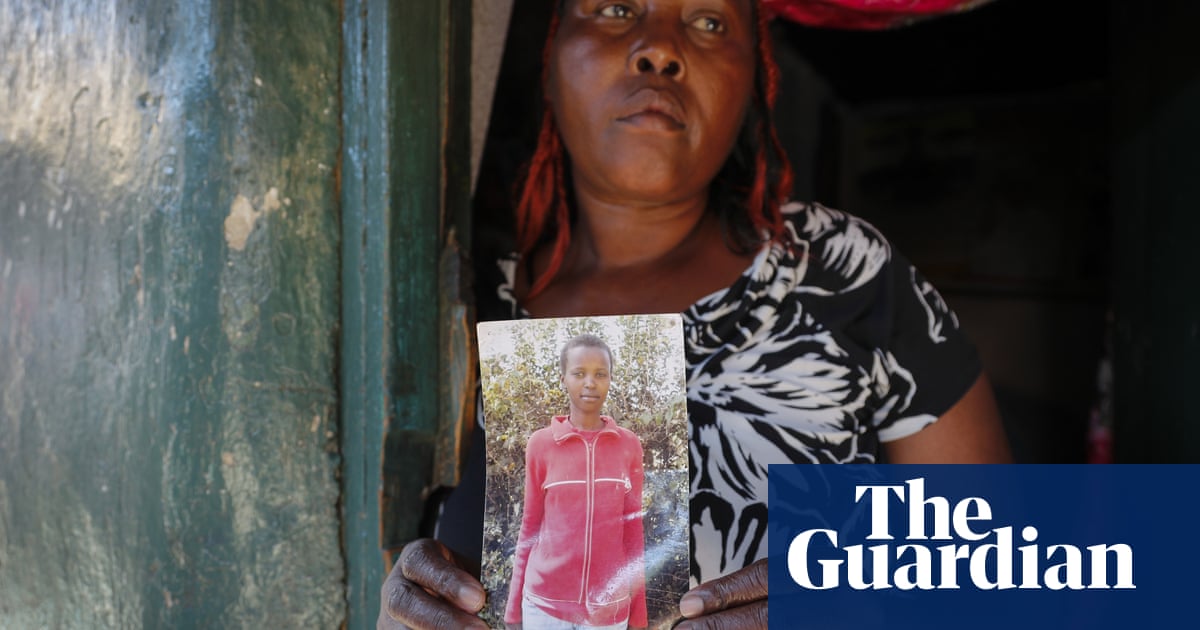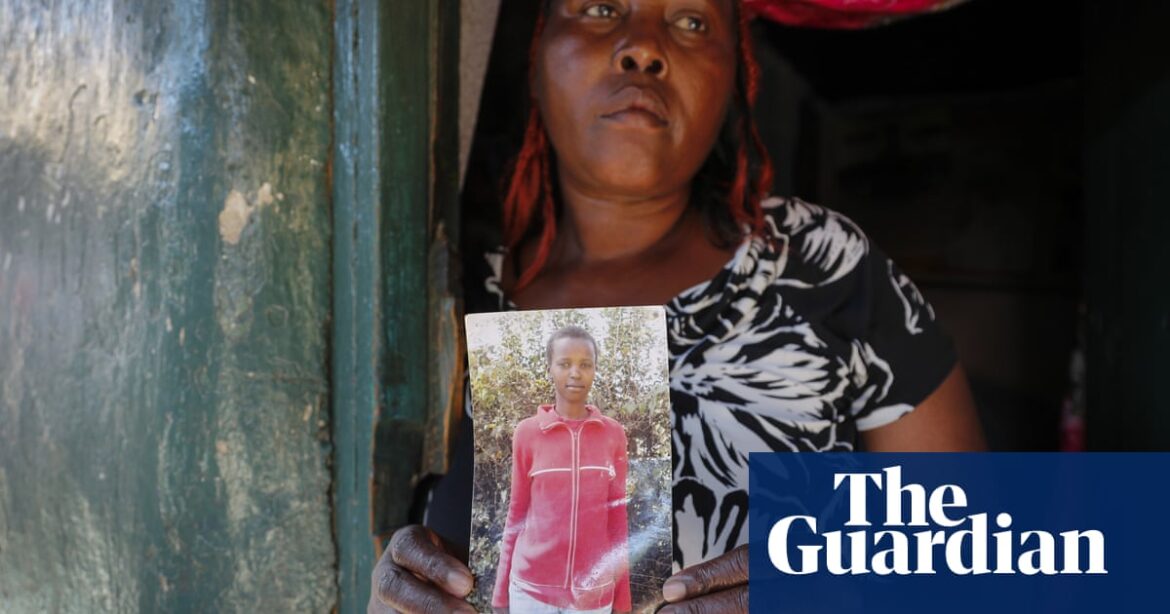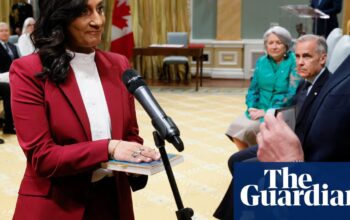
The army is to launch an inquiry into the behaviour of British troops posted to a military base in Kenya, after multiple allegations of serious abuses committed by soldiers, including rape and murder.
The inquiry is to examine the conduct of military personnel posted to the British Army Training Unit Kenya (BATUK). It is where the soldier alleged to have murdered a Kenyan woman, Agnes Wanjiru, was posted at the time of her death in 2012.
An ITV Exposure documentary, airing on Sunday, returned to Nanyuki, close to the base, and found that allegations of abuse were still emerging. British soldiers were alleged to have regularly paid for sex with local women, and to have raped multiple women as well as girls as young as 13.
An MoD spokesperson said: “The defence secretary has discussed with the chief of the general staff these alarming allegations of unacceptable behaviour by service personnel deployed to Kenya.
“We take these allegations extremely seriously and the army will launch an inquiry into the conduct of those who have been deployed to Kenya.”
Reacting to news of the inquiry, Wanjiru’s niece, Esther Njoki, said: “All we want as a family is closure, but we will not get this without answers and without steps being taken to make sure what happened to Agnes never happens again.
“The UK Ministry of Defence has repeatedly promised us and assured us that steps are being taken to investigate but we are tired of assurance without actions. We want to see action now – action to properly investigate what led to us losing Agnes and us still not having answers more than 12 years on.”
The previous government prohibited British troops from paying for sex overseas and warned they could face dismissal if they contravened the ban. However, the allegations from ITV suggest it is being consistently flouted.
The ban followed a Sunday Times investigation into the death of Wanjiru, a young woman who lived in poverty and sometimes sold sex to help provide for her daughter.
She lived in Nanyuki, where soldiers would socialise in their downtime, drinking heavily and paying local women as little as £1 for sex.
Wanjiru, who was stabbed multiple times, was last seen drinking with British troops. A Kenyan inquest found that one or more British soldiers were responsible for her murder.
Yet despite a suspect being named by several members of his regiment, and a witness providing startling testimony in which he described being taken by the alleged perpetrator to see Agnes’s body in the septic tank where she was later found, nobody has been prosecuted over her death.
The defence secretary, John Healey, who pushed the previous government to act in the case, has said he will meet Wanjiru’s family – the first UK secretary of state to do so.
“The defence secretary has long recognised the tragic circumstances of Ms Wanjiru’s death and maintains and reaffirms his commitment to the pursuit of justice for Ms Wanjiru, and for Ms Wanjiru’s family, as a priority,” the MoD spokesperson said.
“Since his appointment to the role, he has directed that the department should take every possible step to ensure the fullest cooperation with the Kenyan authorities in this matter. The secretary of state would welcome a meeting with the family.”
In its defence strategy, published after public outcry over Wajiru’s death, the MoD said it “prohibits all sexual activity which involves the abuse of power, including buying sex while abroad”.
However, two women in Nanyuki told ITV they had been raped recently by soldiers, while another said girls as young as 13 were among those being abused by British troops.
Eve told ITV she was 14 when she agreed to have sex with a British soldier for money in March last year. She said she was taken to a house, her phone was taken from her, and she was raped by a group of men, who she said were “guys from BATUK”.
“To my surprise, there were seven people,” she told ITV. “So they started using me. This one finished, this one came.”
Eve, now 15, said she felt like the men “wanted to kill” her, adding: “Because of how they were treating me, you wouldn’t understand, like an animal.”
When she told a friend what had happened, they replied: “They have money and you do not. There is nothing you can do.”
after newsletter promotion
Faith, 28, told how she was raped by a group of six men after agreeing to go back to a house with one British soldier. She spoke to ITV less than two weeks after the incident, in March this year.
The assault lasted almost two hours, during which, she said, she feared she would be killed. “I was so scared,” she said. “I wanted to scream. And then one of them held my mouth … I decided to keep quiet. Almost two hours continuous. One after the other, one after the other.
“They just do what they want, and then they go,” she said, adding that she had been left injured. “The next two days I couldn’t even urinate. It was terrible … My mouth was so painful.”
Joy, 28, another Kenyan woman, told ITV: “My first time as a sex worker was with a British soldier. I was around 17, just after high school, but I’ve found others come very young, around 13, 14, 15.”
She also said women had been subjected to serious violence by British soldiers. In one incident she described, a sex worker had been urinated on by a British soldier who she thought had agreed to have sex with her.
“He just urinated on her,” she said, and when the woman questioned him, he is alleged to have told her: “After all, you’re here for the money – and here’s the money … I wasn’t interested in sex anyway. I was just here to have fun.”
Joy said: “So he finished, walked out, and left the girl.”
Describing a second incident, she said another woman had been raped by a soldier who had forced her into anal sex, before leaving money on the bed. “After she exchanged the money into Kenyan shillings,” Joy said, “they were less than agreed for the night.”
In the documentary, a British soldier posted to Kenya was also recorded undercover admitting that soldiers still paid for sex: “The seniors, sergeants, warrant officers, RSMs [regimental sergeant majors], colour sergeants, they will all cheat on their wives and fuck out here because it’s a break.”
Kenya has been running its own public inquiry into allegations of human rights breaches and abuses of power connected to the base, to which members of the local community gave evidence this summer.
The MoD spokesperson said: “We expect the highest standards from our personnel, are committed to preventing sexual exploitation in any form and, through our zero-tolerance policies, will hold to account anyone found to be involved.
“The Royal Military Police and BATUK work closely with the Kenyan police liaison officers, local community and county leadership to swiftly address any concerns, with the defence serious crime command investigating any allegations of serious or complex crime where necessary.”
The Base: A British Army Scandal airs on Sunday 29 September at 10.20pm on ITV1.
Source: theguardian.com



